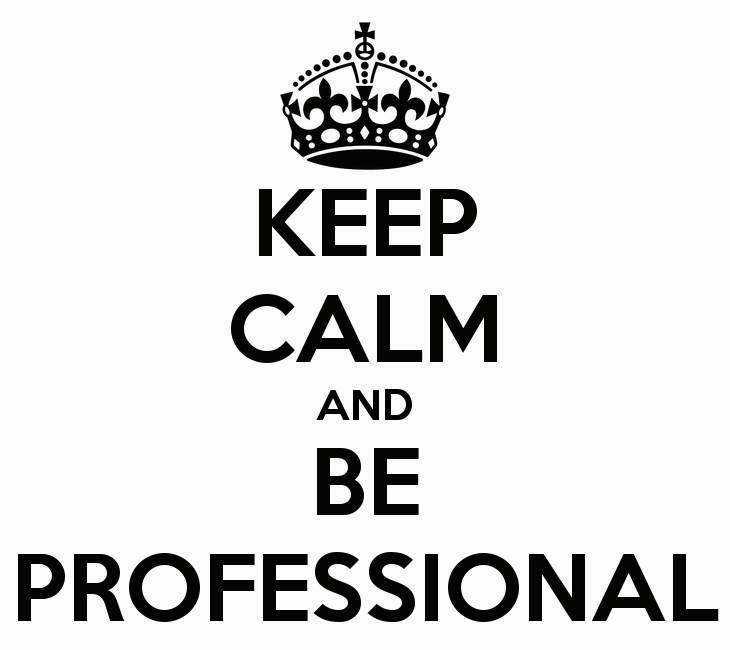Most people know what it takes to be considered a professional at something, High levels of competence, reliability and exceptionalism … but I want to talk about the last 2% of what it takes to become a consummate professional. It involves how you react to things, specifically shitty situations and people. I’m going to throw out a couple of scenarios to illustrate what I’m talking about
– What do you do when a coworker has just told your boss that your work is awful and you don’t deserve to be at the level that you’re at in the company, and then that coworker comes over to ask for your help with something?
– What do you do when an engineer comes to you (as the lead) with 2 days to launch a big project and tells you the launch date won’t happen because a bug they were trying to fix, quietly (emphasis on quietly, nobody else knew about it) turns out to be much more serious than they thought?
– What do you do when you think a client is clearly stretching out final payment by sending you on wild goose-chases after bugs that aren’t really bugs, or arguing that things you uncovered as issues before the project started are actually your fault; insisting you fix them without charge before you get paid?
– What do you do when your boss takes credit for your work and ideas in the big presentation after weeks of insisting that they would never work, and gets a promotion because of it?
– What do you do when during a friendly debate with a coworker at lunch, they suddenly get personal and heated for no particular reason?
– What do you do when the team lead who shot down your approach for testing and releasing your feature at the last minute, has no problem when someone else attempts the same thing a week later?
– What do you do when you catch your coworker lying about the cause of a bug, trying to throw someone else under the bus for something that was their fault?
– What do you do when a previous company tries to screw you over after you’ve given notice that you’re quitting, examples include messing up your health insurance paperwork, or insisting that you return the company phone even though usually you can pay a fee to keep it upon separation, or badmouthing you through back channels in a small town (workwise)?
– What do you do when you realize a client of your company has a problem with you being gay/black/latino/Middle Eastern/White/a Woman, is trying to get you off their project and your company is refusing to back you up?
– What about if a coworker uses disparaging or condescending language in addressing you on slack or in JIRA tickets?
What I’ve learned over the course of my career is that the times when you need to be at your most professional are the moments when you least feel like it. Responding to underhanded coworkers, dickish bosses, an executive team with no backbone or angry clients when you’re angry and justifiably so, without losing your cool, is one of the hardest things you might ever have to face in your career. Just because you feel justified in responding in kind to a put down or dressing down an underperformer, doesn’t mean that you should. The top professionals I’ve met respond to these kinds of situations by
– Staying completely calm
– Trying to take the emotion out of it
– Trying to resolve the situation without ascribing blame
– Not getting drawn into an emotional exchange
– If the other party is unreasonable or shitty, ending the interaction as quickly as they can or escalating it to someone with more authority (this might mean involving a lawyer if you’re your own boss)
– Avoiding shitty people, but remaining pleasant and polite in all your interactions with them
Taking the high road has the key benefit of getting the crappy situation/person off your mind faster than if you engaged with it. For example, say you respond to a coworker questioning your abilities by getting annoyed and attacking their own abilities. Very quickly the situation escalates into one that requires people to pick sides, or one where everyone is walking on eggshells for several weeks till both of you or one of you is fired or disciplined. Maybe you win, maybe you lose … but what could have been out of your mind after that day, has now turned into a month long ordeal that has lessened everyone’s opinion of you.
High price to pay for “showing them” hunh?
Naturally, this is a very high bar to attain, and in my life, I think I’ve only met 2 people I would consider total pros in this way. My big problem is that its hard for me to remain calm when I’m dealing with people that I think are jerks, its a personal trigger for various reasons, but I think over the last few years I’ve improved very drastically in this area, mainly by coming to the epiphany that just because I may think of someone as a jerk doesn’t necessarily make them one. Like the old saying goes
“If you run into an asshole in the morning, you ran into an asshole.
If you run into assholes all day … you’re the asshole”
Don’t become an asshole by mistake.
